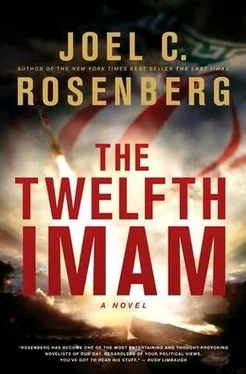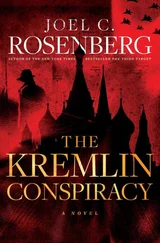“I just have one request, Mr. Ambassador,” Charlie said at last.
“What’s that?”
“You must promise me the Shirazis can come too.”
The ambassador and the Shirazis looked stunned.
“Charlie, that’s very thoughtful of you,” Mohammad Shirazi said, “but I don’t really think that’s possible at this point.”
Charlie ignored him. “Mr. Ambassador, they saved the life of two Americans. The regime will kill them if we leave them here.”
“I understand,” the ambassador said. “But it’s out of my hands. Think about it, Charlie. It’s one thing for your government to extract two of its own diplomats out of harm’s way. It’s quite another thing to-”
But Charlie cut him off. “Put me on the phone with whomever you’re talking to at Langley,” he said firmly. “Claire and I aren’t leaving unless the Shirazis come with us. They saved our lives. The very least we can do is save theirs.”
Ten years later
Tehran, Iran
June 3, 1989
Hamid Hosseini had been at his master’s side for three decades.
He could not bear to see the man suffer. For the past week and a half, he had been one of only three clerics allowed to sit beside the hospital bed of Ayatollah Ruhollah Mousavi Khomeini. For eleven straight days and nights, Hosseini had gone without food, begging Allah for his master’s recovery. But relief had not come. The cancer continued to consume the eighty-eight-year-old cleric. The doctors were unable to stanch the internal bleeding. The master’s time seemed to be at hand.
Hosseini’s eyes filled with tears. He and his master had been through so much together. They had accomplished so much. It couldn’t end now. Their mission was not yet complete.
Hosseini got up from his prayers and quietly stepped into the hallway to compose himself. He still vividly remembered the first time the two men had met.
The year was 1963. Khomeini’s popularity was soaring, and not just among theologians. The people of Iran were falling in love with this fiery, radical preacher, and so was Hosseini. At times Khomeini preached to crowds of a hundred thousand or more, and in June of that year, Khomeini invited Hosseini to be his guest as he delivered a major address. Hosseini eagerly accepted, sharing breakfast that morning with the master in his home, asking him a thousand questions, driving with him to the site of the speech, and sitting just a few yards away as the address began.
Hosseini could still recite the speech in full. He had been mesmerized as Khomeini blasted the Shah as a “miserable wretch” who had allied himself with the “parasites” of Israel. He’d been enthralled as Khomeini denounced apostate Islamic clerics throughout Iran-allies of the Shah-as “impure animals.” And he’d been shocked by hearing Khomeini predict that the Shah would be forced to leave the country.
Even so many years later, Hosseini could recall his electrification, the crowd’s swell of emotion. No one had ever spoken of the Shah that way. The masses went crazy. They were ready to overthrow the Pahlavi regime right there and then. But it was not time. Two days later, the Shah’s secret police forces decided to move, arresting Khomeini and everyone who had been on the platform. But that just generated more sympathy and support for Khomeini.
Uprisings of support quickly erupted in cities throughout Iran, including Tehran, the political capital of the country, and Qom, the country’s religious capital with its scores of seminaries and other Islamic institutes. Large crowds of Khomeini supporters took to the streets shouting, “Khomeini or death!” The Shah imposed martial law the following day, but his forces overreacted, opening fire against Khomeini’s supporters. The official count of dead and wounded protesters was fifteen thousand.
Hosseini had never been to prison before then. He’d never been tortured. He’d never even imagined such a scenario. But he was not sorry for his friendship with the man responsible for his new fate. To the contrary, he counted it a great honor to suffer together with the great man for the sake of Allah.
For the next ten months, the two remained imprisoned together, but they could not have scripted events better if they had tried. Khomeini was becoming a national symbol of the Shah’s oppression of devout Muslims. He was steadily emerging as the leader of the Islamist opposition to the Shah, a role that suited him perfectly. And Hamid Hosseini was universally identified as one of the Ayatollah’s most trusted aides.
On April 7, 1964, Khomeini and his supporters were released, and major celebrations were quickly organized, particularly in Qom, where seminaries closed for three days to hold parties in his honor.
But the Ayatollah was not interested in parties. He wanted a revolution. He wasted no time in using his newfound fame and popular support to launch new, even more strident broadsides against the Shah. And Hamid Hosseini was again at his master’s side on October 27, 1964, when the imam delivered a speech that accused the Shah and his secularized government of treason and urged Shia Muslims throughout Iran to “come to the aid of Islam” by attacking the apostate, infidel regime.
“O Allah, they have committed treason against this country,” Khomeini bellowed to a crowd of thousands. “O Allah, this government has committed treason against the Qur’an… They are not our representatives… I dismiss them… O Allah, destroy those individuals who are traitors to this land and traitors to Islam.”
On November 4, 1964, the Shah’s forces arrested Ayatollah Khomeini again and sent him into exile in Turkey. Hamid Hosseini, now a close friend and trusted aide to the imam, was exiled as well. But the two men could not have been happier. All the people of Iran saw Khomeini as the Shah’s leading opponent and Hosseini as his chief spokesman and confidant. And now they were free to make their case without fear of reprisals.
Turkey, at the time, was the epicenter of the reform movement within Islam. It was the place where Muslims adopted Western customs, dress, speech, and even democracy. It was hardly the appropriate base camp for the Ayatollah’s small band of Islamic radicals to plot the next steps of their revolution. They quickly made plans to leave Turkey for Iraq and arrived in Baghdad on October 6, 1965, accompanied by Khomeini’s son Mostafa.
Now, as Hamid Hosseini looked upon his dying master writhing in pain on a hospital bed, tears filled his eyes again, and he had to look away. He did not want to remember Khomeini like this, his life slowly fading.
In the fall of 1977, Hosseini had been at his master’s side when Mostafa had suddenly died under mysterious conditions. He had been in the room when the Iraqi medical examiner said his master’s forty-five-year-old son had died of a sudden and massive heart attack, but of this Hosseini had never been convinced. Far more likely, he was certain, was that Khomeini’s son had been assassinated by the agents of the Shah’s secret police, the SAVAK.
Now Hosseini convinced himself Ayatollah Khomeini was dying as a result of an evil plan. The doctors said it was cancer, but was it really? Perhaps the CIA had poisoned him. Maybe it was the Mossad. It might even have been a joint operation. He had no idea how they had done it. But he had no doubt the Great Satan and the Little Satan were behind Khomeini’s death, and he silently vowed they would both pay for their treachery. The Americans and the Zionists were still trying to smother the Iranian Revolution. But they would fail. With blood and fire, Hosseini vowed, they would fail.
Just then, Hosseini heard choking, gasping.
He quickly turned and stepped back to his master’s side, then stood paralyzed with grief as he watched the convulsions and the feverish efforts of doctors and nurses trying to stop the inevitable. But as suddenly as it had begun, it was over. The choking stopped. The gasping ended. The efforts to save him drew to a close.
Читать дальше












